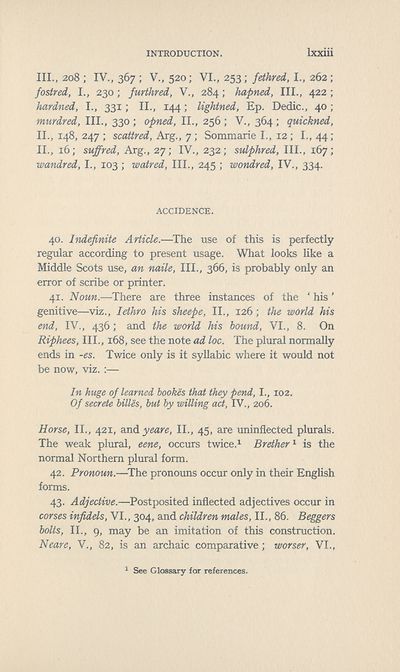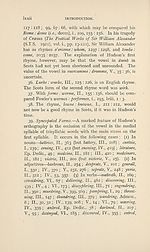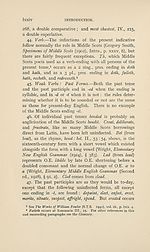Download files
Complete book:
Individual page:
Thumbnail gallery: Grid view | List view

INTRODUCTION.
Ixxiii
111., 208 ; IV., 367 ; V., 520; VI., 253; fethred, I., 262 ;
fostred, I., 230 ; furthred, V., 284 ; hapned, III., 422 ;
hardned, I., 331; II., 144; lightned, Ep. Dedic., 40 ;
murdred, III., 330 ; opned, II., 256 ; V., 364 ; quickned,
11., 148, 247 ; scattred, Arg., 7 ; Sommarie I., 12 ; I., 44;
II., 16; suffred, Arg., 27; IV., 232; sulphred, III., 167;
wandred, I., 103 ; watred, III., 245 ; wondred, IV., 334.
ACCIDENCE.
40. Indefinite Article.—The use of this is perfectly
regular according to present usage. What looks like a
Middle Scots use, an naile, III., 366, is probably only an
error of scribe or printer.
41. Noun.—There are three instances of the ‘ his '
genitive—viz., lethro his sheepe, II., 126 ; the world his
end, IV., 436; and the world his bound, VI., 8. On
Riphees, III., 168, see the note ad loc. The plural normally
ends in -es. Twice only is it syllabic where it would not
be now, viz. :—
In huge of learned bookes that they pend, I., 102.
Of secrete billes, but by willing act, IV., 206.
Horse, II., 421, and yeare, II., 45, are uninflected plurals.
The weak plural, eene, occurs twice.1 Brether1 is the
normal Northern plural form.
42. Pronoun.—The pronouns occur only in their English
forms.
43. Adjective.—Postposited inflected adjectives occur in
corses infidels, VI., 304, and children males, II., 86. Beggers
bolts, II., 9, may be an imitation of this construction.
Neare, V., 82, is an archaic comparative ; worser, VI.,
1 See Glossary for references.
Ixxiii
111., 208 ; IV., 367 ; V., 520; VI., 253; fethred, I., 262 ;
fostred, I., 230 ; furthred, V., 284 ; hapned, III., 422 ;
hardned, I., 331; II., 144; lightned, Ep. Dedic., 40 ;
murdred, III., 330 ; opned, II., 256 ; V., 364 ; quickned,
11., 148, 247 ; scattred, Arg., 7 ; Sommarie I., 12 ; I., 44;
II., 16; suffred, Arg., 27; IV., 232; sulphred, III., 167;
wandred, I., 103 ; watred, III., 245 ; wondred, IV., 334.
ACCIDENCE.
40. Indefinite Article.—The use of this is perfectly
regular according to present usage. What looks like a
Middle Scots use, an naile, III., 366, is probably only an
error of scribe or printer.
41. Noun.—There are three instances of the ‘ his '
genitive—viz., lethro his sheepe, II., 126 ; the world his
end, IV., 436; and the world his bound, VI., 8. On
Riphees, III., 168, see the note ad loc. The plural normally
ends in -es. Twice only is it syllabic where it would not
be now, viz. :—
In huge of learned bookes that they pend, I., 102.
Of secrete billes, but by willing act, IV., 206.
Horse, II., 421, and yeare, II., 45, are uninflected plurals.
The weak plural, eene, occurs twice.1 Brether1 is the
normal Northern plural form.
42. Pronoun.—The pronouns occur only in their English
forms.
43. Adjective.—Postposited inflected adjectives occur in
corses infidels, VI., 304, and children males, II., 86. Beggers
bolts, II., 9, may be an imitation of this construction.
Neare, V., 82, is an archaic comparative ; worser, VI.,
1 See Glossary for references.
Set display mode to: Large image | Zoom image | Transcription
Images and transcriptions on this page, including medium image downloads, may be used under the Creative Commons Attribution 4.0 International Licence unless otherwise stated. ![]()
| Publications by Scottish clubs > Scottish Text Society publications > Third series > Thomas Hudson's historie of Judith > (79) |
|---|
| Permanent URL | https://digital.nls.uk/106910881 |
|---|
| Description | A collection of over 100 Scottish texts dating from around 1400 to 1700. Most titles are in Scots, and include editions of poetry, drama, and prose by major Scottish writers such as John Barbour, William Dunbar, Gavin Douglas, and George Buchanan. Edited by a key scholarly publisher of Scotland's literary history, and published from the late 19th century onwards by the Scottish Text Society. Available here are STS series 1-3. |
|---|

